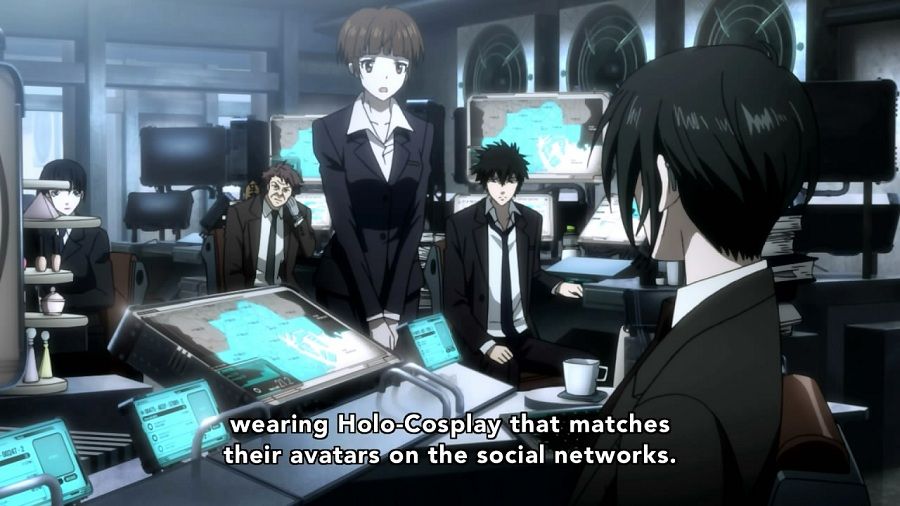Ha so you're on the side that didn't like it. Care to elaborate, so I get better idea what I'm getting myself into.
Just curious, what made it awful for you? With it's frequent use of name dropping and unnecessary quoting I can see a major gripe but I wouldn't call it awful because of it. Though I've seen the QUALITY screencaps from its tv airtime, and was shocked by it (I watched the BD's).
Well I suppose I should explain. I have myriad problems with
Psycho Pass. Here's a handful that I can remember clearly:
- The series looked awful when it aired. One of the ugliest shows I've seen from Production I.G., especially for a "tent-pole" release. I'm not just talking about the animation errors, I'm also referring to the lighting, the colouring, the background art and especially the composition. The composition, and especially the colouring, just made the show look terrible:
- The animation, while occasionally impressive, was largely average with bouts of being completely appalling.
- The writing...well I have a lot of issues with the writing. The laziest way to describe it would be baby's first cyberpunk story, which neatly encapsulates quite a few problems the show has but I will go into more detail. The problem is that the science fiction aspects are never really explored in a particularly interesting or rich way because the story is either focused on dumb action, dumb crimes, or philosophical nonsense.
- Lets talk about our proto-gonist, Akane. The whole conceit of her character is that she's a genius who could do anything but for the sake of naivety and JusticeTM she ends up working as a cop. The problem here is that the audience needs to be told everything about how the world works 'cus it's scifi, so usually in these kinds of stories the hero is a character who knows nothing (amnesia perhaps, or he's travelled in time, or some other dumb conceit) so he can ask people questions about how the world works so the audience knows. But Akane-Hana-Kana-Chan is a super genius so she should know everything, but she acts like she doesn't and has to keep asking people and being informed by people how stuff works that she should already know. This goes on, episode by episode, for weeks.
Or, as mac put it:
mAcOdIn said:
From seemingly not understanding how the Sybil system works and how it affects people, to not understanding how people's mood and emotion can change as well as their hue despite seemingly writing a paper on it, to basic shit relating to her job, she just comes off as stupid.
More
here.
- Leaving aside characterisation because, frankly, everyone else in the show is pretty poorly written, lets move on to the other problems with the writing. No one talks like a human being in this series which is why none of the characters resemble actual people. There are three main things characters talk about: the case at hand, how stuff works in the future (exposition) and philosophy. People will just casually launch into conversations about the nature of Justice and Freedom at the drop of a hat and everyone sounds like they're reading from a pre-written speech on the subject. It never feels organically integrated into the characters or the story. Or as I said earlier:
In what I'm discovering is fairly typical Urobuchi style, everything that happens is extremely predictable. If you think a certain character is going to do X and then do Y that's probably exactly what plays out in the story. Whether or not this is a 'problem' with his writing style is up to you, I suppose, but it's not a very attractive feature in a series that's firmly rooted in the police procedural genre.
More problematic than that is his attachment to exposition-heavy dialogue, something which is theoretically a hold-over from this days of working on visual-novels. I'm not simply referring to the kind of exposition that goes on, at length, to explain various aspects of the world. I'm also talking about character exposition, a slightly different kind of exposition. The nub of the matter is this - far too often characterisation is achieved not through naturalistic dialogue or action but through long-winded speeches that explain every aspect of their own personal philosophy. They literally explain everything about themselves and why the act as they do. Not only does this make for some really unrealistic (and long) conversations but it's also extremely lazy. A better, subtler writer, would use dialogue about between characters to allow us to indirectly infer to give us some insight into their character, or we'd learn about the character through the actions they perform. Literally having them explain themselves is the worst possible option.
- As a result of all this pointless chin-waging between characters it feels like whole episodes are wasted as heroes and villains wax lyrical about freedom and name drop sci-fi writers and philosophers like they're teenagers. The pacing is atrocious.




